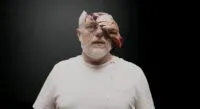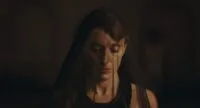Kombucha is a satirical horror film about the dilemma many creative people face between work that satisfies their souls versus more commercial jobs that pay well. Oh and it’s about health fads and other issues too; a wild and potent mix, which made for a fascinating conversation with its director, Jake Myers.
I asked him whether there was a particular moment in the film that came from his experience of workplace stress, or that of writer Geoff Bakken. “A lot of this is from my workplace stress,” he said. “The constant pressure to work the day job and pursue creative passions, and I want to just direct movies! It’s what fills my life with joy; joy, frustration, all of it, of course, but definitely joy. My writing partner, Geoff, had a similar situation. I think the corporate language was something he was attuned to especially, as an inspiration for the film.” I was steadily feeling called out by the film too: I just want to write about films, but I have a day job for an energy company in London.
But what about the visuals, I wondered, and the body horror elements of the film? Were there any real-life anecdotes which found their way into the film? “I have ADHD,” Jake said, “and I take a medication for that, because it can present as a problem: it basically looks like I’m daydreaming in my job if I don’t take it. It’s really good, it helped me hit my numbers and do really well, but it does have side effects. We can do things to try and be high performers, but they can take a toll on our health.”
The body horror in Kombucha involved practical effects to a large degree, and I asked Jake whether they required taking risks or trying anything experimental that paid off. “Actually, yes,” he said. “I am pretty proud of the practical effect which was a medical device where Kelsey provides Luke with her own Kombucha. I think you know exactly what scene I’m talking about; but without spoiling anything, it involves a medical device, we had three people pumping it, and we couldn’t actually use the medical device on Claire, the performer, because it had to be on a flat-chested person. And I’m so happy with how that turned out.” Having seen the film, I could tell how carefully Jake was talking around that description!
In indie and low-budget films, there are always instances of problem-solving and trouble-shooting. I asked Jake what solutions he had to find in the making of Kombucha. “Making a giant sentient SCOBY, making a monster, is always going to be hard; especially if it’s as big as it was. We had some serious fabrication problems. So when we actually looked at the footage, having done it on set, it wasn’t moving the way we wanted, it didn’t read the way we wanted it on screen. So I talked with my friends from Third Beacon, a post-house in Chicago who I’ve actually worked for, and said ‘what can we do to make this work?’ and I think the visual effects they did saved the film. I think the creature in Kombucha is pretty cool. I’ve had people ask me if it was a practical effect: the truth is the performance is practical, but everything you see on screen is CGI.”
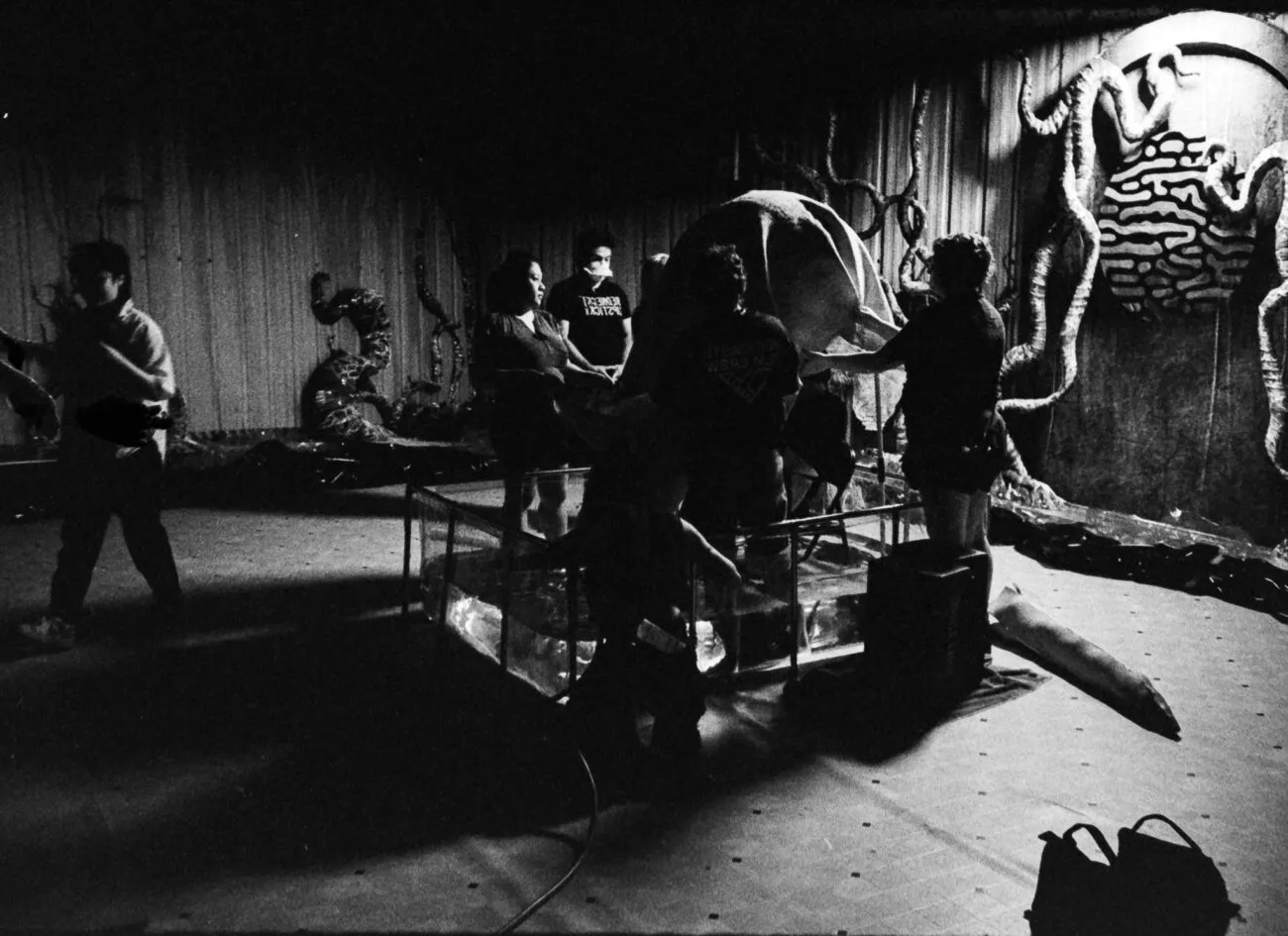
It’s good to see that the two can be married together; CGI alone can look fake. “I feel the hybrid is where you get it,” agreed Jake. “Because it’s all in service of the story, right? I’m not dogmatic about practical vs. VFX, I think the way to sell it best is to combine the two.”
I asked Jake whether he had hopes for the film to spark conversations about the working environment. Other films such as Office Space and Severance have covered similar themes, of course, so I wondered if Kombucha is taking the message in a different direction. “I love those films,” said Jake, “and I feel there is something very relatable, unfortunately, about Kombucha; and about how productivity is how we determine our value to the world right now. How much can we produce? How much value can we add to our company? With this movie, I want to put a big question mark on that: is that what you contribute to the world; and the value you add to some corporation, is that what you want to be remembered for? Does it make you feel good? Is that the person you always wanted to be, or is that the slimy version that has completely replaced you?”
I was starting to squirm again, trying not to think about how hard I’d been obliged to perform in my own day job just earlier the same day. “I’m so sorry,” said Jake, sympathetically. “But now I hope there is some joy you can find in this interview.”
Well, he did intend it to be a relatable theme, and that’s often where the richness and depth is to be found in satire and horror comedies: they push viewers to consider familiar subjects in different ways. “I remember listening to an interview with Jordan Peele,” said Jake. “He talked about Get Out, and he said the point of reference he wanted everyone to have was meeting your significant other’s parents for the first time. It’s an almost universal shared experience for everyone that comes with fear or anxiety. I think that my jumping off point for Kombucha is the fear of starting a new job: it is terrifying to go into this unfamiliar territory, you don’t know who you are in this place. And also the fear of being replaced, being replaceable or not having some utility for the world is terrifying, it brings some real existential dread.”
Kombucha covers other themes, including, of course, health drink fads as well as selling out to a day job and corporate culture. I asked Jake if he had thought about his film influencing future trends, or if that was a bit much to expect. “I am always sceptical of health trends,” he said, “especially those which they try to tell us are the replacement of something, like ‘the new coffee, and without jitters or side-effects’. Any time there is a promise and people are trying to sell you on it hard, I always feel sceptical that there might be some ulterior motive. The other thing with kombucha specifically, the beverage, is it’s starting to appear in start-ups: kombucha on tap is something tech start-ups are having in their workplace as a nice little perk. It used to be coffee, right? What’s a nice thing to keep workers productive and help them feel happy and appreciated? It’s coffee. We wanted the film to feel very now, of this moment, and it’s happening.
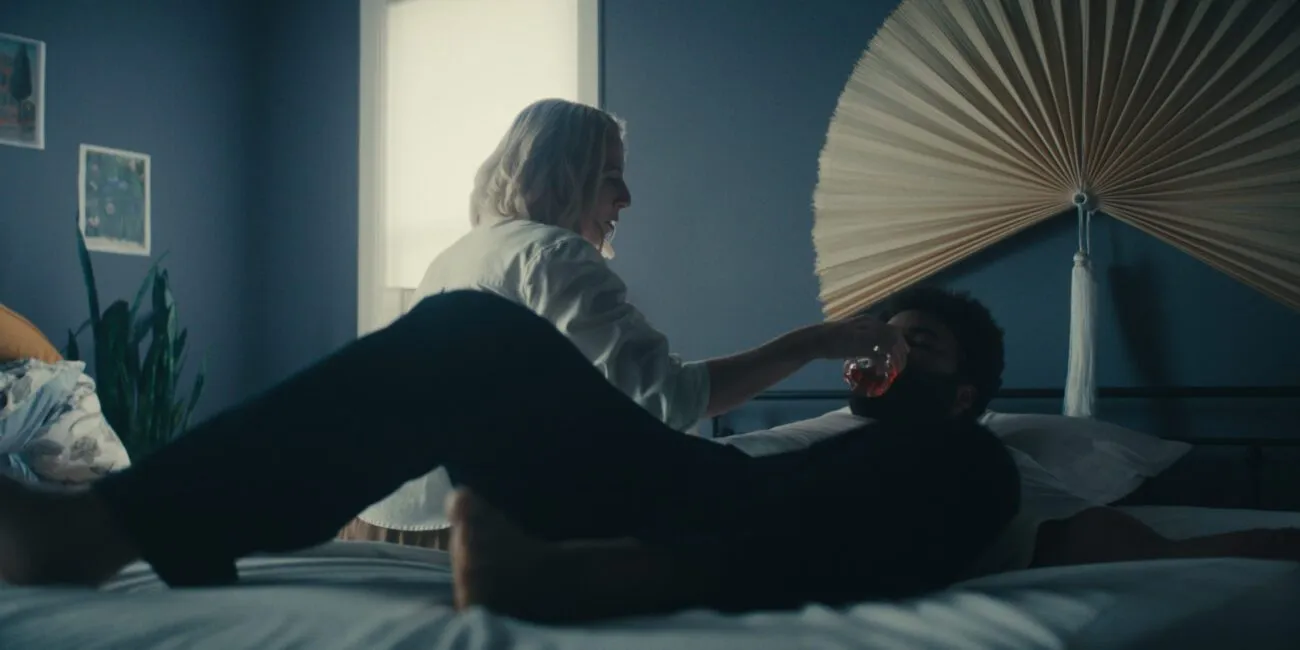
“I think that we can get lulled into a trance where we just go along with the path of least resistance. And occasionally, we just need to get spooked and made aware that these things are happening, that we are being led down a path, that we ought to be more intentional in our choices: because we do make choices, hard choices. I don’t want to make this film feel preachy, I want it to be something where we are all doing some negotiation with our lives and how we pursue comfort and stability and whatever creative ideas we want to share with the world. So I guess that’s the thing: I want it to be an interruption to that pattern which can lull us to sleep.”
The tone of the film mixes horror, satire, humour and a little domestic drama; primarily horror and satire. I asked Jake if there was any element which he wished he had pushed a bit more, perhaps taken more risk. “Yes,” he said very decisively. “I wish I’d established more dread in the first act of the film. I feel like there was a little bit, but when I watched it with an audience, there were moments when I felt there should have been more. I’d wanted to give a slow reveal, give viewers little crumbs that led to this moment: once the door opens and the room is red, everything is different, right? There’s no putting the toothpaste back into the tube. But I do feel that if there was another version of Kombucha, or I made a sequel in the future, I would want to start that dread sooner, so audiences might want to yell ‘turn around!’
Personally, I thought the opening scene did that job well. The general vibe of the film ebbed and flowed, mind you. I commented to Jake that the office scenes brought back to mind Sorry to Bother You and that later ones reminded me of The Substance. “I love The Substance,” Jake said. “I’m really glad that I didn’t watch The Substance until after we finished production. I intentionally avoided watching it because I had a feeling I would find myself wanting to remake it, and didn’t want to take too much from it. As we were approaching production, everyone in my orbit was telling me ‘you need to see this film, you’re going to love it.’ I honestly feel like one of my influences is Alex Garland: Ex Machina is at it’s core a B horror movie, it’s about a mad scientist doing experiments, bringing someone in, and dealing with the fallout. He does it in such a way that is so precise, glossy and serious that I feel the film is elevated to something beyond. It’s an entertaining story that we’re familiar with, an entertaining arc; but the way that it’s handed never gets exhausting, you lean in the whole time that you’re watching it. Alex Garland inspired the look of Kombucha too. We wanted that soft back lighting, a lot of these drab colours; so in the moment when the horror hits, it has some kind of punctuation. That and Mike Judge: Silicone Valley, Office Space, I feel like those were humour inspirations for me.”
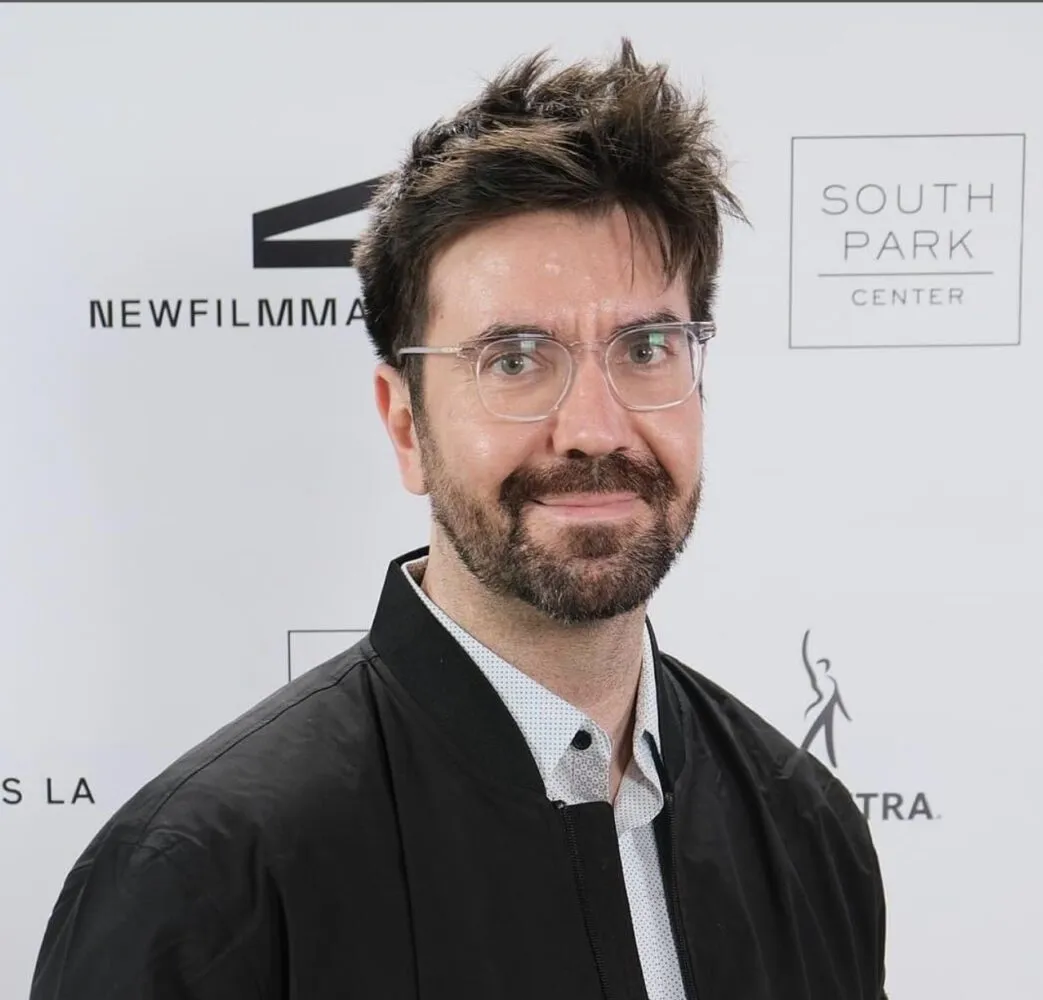
I regretted not speaking to Geoff Bakken too, because I was curious about the writing. Often when I review films, I find my feelings about a film can become clearer while I’m writing them; and so I asked Jake whether the script of Kombucha evolved to something at all different by the time it was complete. “Geoff wrote the initial script,” Jake said, “and then we wrote a short film together. We took the short version on a little festival tour, found out what was working and not working; so we brought back those lessons to the feature, which Geoff rewrote, getting the language and details just right. As we developed the story, I think I got steadily more sceptical of my job, but also more empathy for people in different positions. I did reflect on my own life, and that does give the film a little bit of weight.”
For me, the people who were most sympathetic were those who were crying out for a change, but didn’t know where to find it. “Exactly,” Jake said. “But the one I really love was Tammy, the mother. She’s one of those ‘well-intentioned kooks’, and I think I managed to bring some sympathy to them with her. In her heart, she really does desire the best for everyone, but gets the details wrong, and once a narrative takes hold she goes with that. And I do feel that in the course of making the movie, I think I have a little bit more sympathy for well-intentioned kooks.”
Jake had mentioned the original short film just now; I asked how different the full feature turned out to be from that. “I think the short film is like a combination of seven pages from the feature,” he said. “It’s truncating the core ideas to get there as quickly as possible, and see if people want to sit with it. If people didn’t want to sit with that core idea, we really shouldn’t make a feature about it.”
The UK premiere of Kombucha took place at Frightfest a couple of months ago. I asked Jake how it went down there. “It was amazing,” he said. “I was really pleasantly surprised. We had one of the smaller theatres, and we sold out the first night. I didn’t know any more than about three people in London; but a crowd of people came in, then they talked about it, and a second screening sold out, and a line formed of people waiting to go in, which was really good to see. It was a moment when I could really feel ‘OK, I didn’t make a stinker! People are talking about this.’ It landed with that audience and it felt great.”
Jake had casually referred to a sequel earlier: I asked him whether that was really going to happen. “We’ve been talking about a sequel to Kombucha. In the meantime, I do have a slasher that’s slated to start production next summer though.”
Jake Myers’s film, Kombucha, will be screened on 12 October at Grimmfest, Manchester.
You might also enjoy:
Grimmfest interview: found footage and geological time with Dan Asma
FrightFest 2025: ’90s Throwback ‘213 Bones’ Brings Us Back to the ‘Scream’ Wave of Whodunnits


